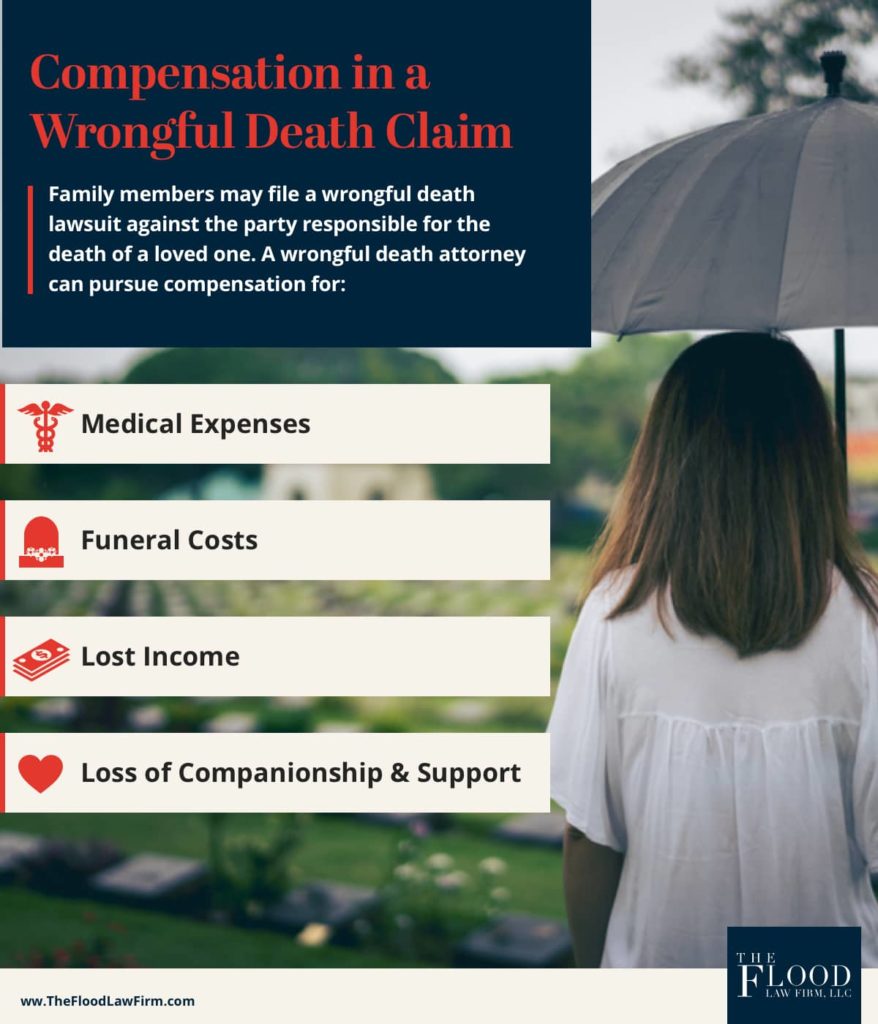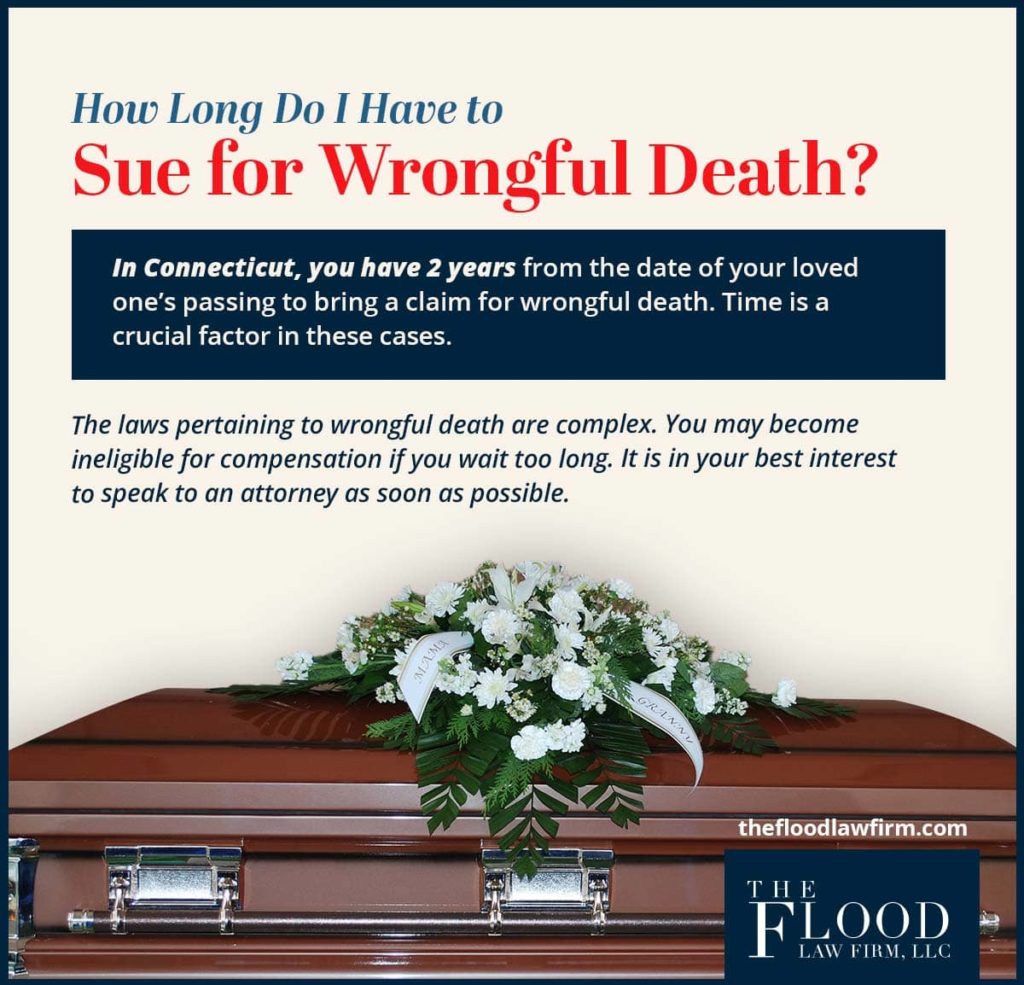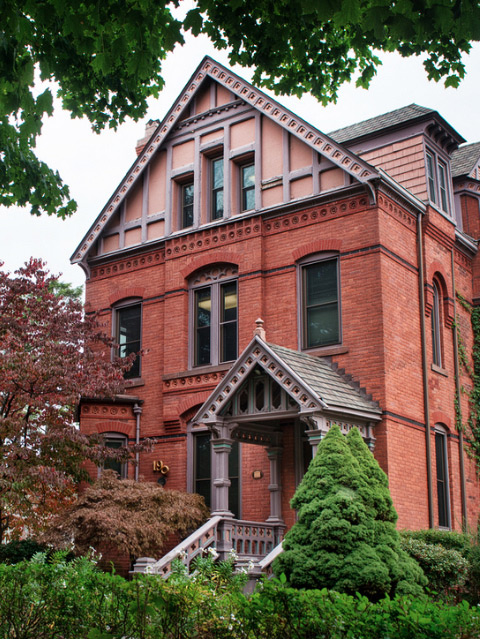Wrongful death occurs when a death is a result of a negligent act of another person or persons. In these cases, the loss of a loved one is worsened by the knowledge that this should not have happened. Dependents or beneficiaries of the victim may be entitled to compensation by filing a wrongful death claim.
Call today for free consultation (877)-987-9LAW
Connecticut has a statute of limitations for wrongful death lawsuits. A claim of wrongful death must be brought within two years from the date of death, and no more than five years from the date of the negligent act. In these types of cases, time is a crucial factor.
At The Flood Law Firm, we can provide legal guidance through the process of a wrongful death claim. You need a Connecticut wrongful death attorney experienced in handling matters as serious as these. We have the resources and experience necessary to pursue compensation on your behalf.
Frequently Asked Questions About Wrongful Death Claims
Who Can Sue for Wrongful Death in Connecticut?

Many different people may be negatively impacted by the death of a loved one. However, only one individual can actually bring a wrongful death claim, and that is the executor or administrator of the decedent’s estate (also known as the personal representative).
The executor is the individual named in the decedent’s will. He or she is responsible for the administration of the estate, including payment of debts, distribution of assets, and, if negligence is suspected in the death of the decedent, filing a wrongful death claim.
An administrator fulfills the same functions as the executor. The principal difference is that the administrator is appointed by the court when a person dies without a will.
If you have been named the executor or administrator of your loved one’s estate, it is important to speak to a wrongful death attorney as soon as possible. A knowledgeable lawyer can review your case for free and discuss what is involved in pursuing compensation.
Read More: Who Can File a Wrongful Death Claim?
What Are the Elements of Wrongful Death?
For your wrongful death claim to succeed, your attorney must prove the following:
- A duty of care was owed to your loved one by the defendant(s). Broadly speaking, the “duty of care” is the responsibility to avoid actions that could result in foreseeable harm to someone else.
- The negligence of the defendant(s) represents a breach of this duty. Evidence must show that the actions of the defendant (or defendants, if multiple parties were involved) violated the duty of care owed to your loved one.
- Negligence caused your loved one’s death. The evidence must show that the wrongful actions of the defendant(s) directly contributed to the death of your loved one (or to injuries that later resulted in death, if death was not instantaneous).
- The estate and surviving loved ones have sustained damages. Both the estate and the family of the deceased are entitled to compensation for losses incurred as a result of the decedent’s wrongful death.
Proving one or more of these elements on your own can be challenging. A wrongful death lawyer can investigate your loved one’s death immediately to ensure that all necessary evidence is preserved.
Your attorney can make a strong claim on your behalf and fight for the full compensation you and your family deserve. The insurance company may offer to settle your case, or it may be necessary to go to trial.
Attorneys at The Flood Law Firm have unmatched experience in the courtroom compared to other firms in the area. We make it our priority to protect you from the machinations of insurance carriers and pursue the outcome you and your family deserve.
Who Gets the Money in a Wrongful Death Lawsuit?
Only the personal representative of the decedent’s estate (i.e., the executor or administrator) can initiate a wrongful death action. However, in the event of a settlement or trial award, wrongful death damages may be distributed to multiple parties.
Connecticut law explicitly recognizes the right to recovery of the following damages in wrongful death claims:
- The decedent’s estate is entitled to recovery of “the cost of reasonably necessary medical, hospital, and nursing services, and including funeral expenses” as well as personal injury damages to which the deceased would have been entitled, such as pain and suffering (see Connecticut General Statutes § 52-555a).
- The decedent’s spouse or civil partner is entitled to compensation for loss of consortium, or damages for the “loss of the society of, affection of, moral support provided by, services provided by, sexual relations with, or companionship of the other spouse, suffered because of the death of the other spouse” (see Connecticut General Statutes § 52-555b).
The courts in Connecticut also recognize the right of surviving children to seek compensation for the loss of a parent’s love, affection, care, and guidance. However, the right to recovery only extends to children who were minors (under the age of 18) at the time of the parent’s death.
Finally, once all of the wrongful death damages owed to the estate, surviving spouse, and/or children are paid, compensation can be awarded to other individuals named in the decedent’s will (or in accordance with Connecticut’s law of intestate succession, if there is no will). A Connecticut wrongful death attorney can assess your case and determine what compensation you may be entitled to under the law.
Read More: Who Can Recover Damages for Wrongful Death?
What Is the Average Settlement for Wrongful Death?
As with the majority of personal injury claims, most wrongful death cases settle before going to trial. Before you accept a settlement, you need to review the offer carefully to determine if the amount meets your needs and the needs of your family.
The “average” value of a wrongful death settlement should not enter into your decision. What matters most is: Will the settlement cover the current expenses you and your family are facing, as well as provide just compensation for the tragic loss of your loved one?
A knowledgeable Connecticut personal injury lawyer can help you answer this question. Your attorney can also act on your behalf to negotiate a favorable settlement.
What Is the Statute of Limitations for Wrongful Death in Connecticut?
The time limit for a wrongful death claim can be found in Section 52-555 of the Connecticut General Statutes. By law, you have 2 years from the date of your loved one’s passing to bring a claim for the wrongful death.
You have a limited amount of time to seek fair compensation for the loss of a family member due to someone else’s negligence. It is in your best interest to contact a Connecticut wrongful death attorney as soon as possible to ensure that your legal rights are preserved and you have sufficient time to make a claim.

Types of Wrongful Death Cases

There are several areas that fall under the wrongful death category. Wrongful deaths may arise due to negligence by manufacturing companies, doctors, or hospitals. The following reflect a few examples:
- Medical malpractice
- Motor vehicle accidents
- Truck accidents
- Product liability
Medical malpractice occurs when there is evidence of negligence by a medical provider or health care facility, such as delay in diagnosis or treatment, errors in surgery, or improper treatment of a medical condition.
Automobile manufacturers are responsible for ensuring their motor vehicles function properly and safely. If one of its products causes harm to a person that results in death, such as a faulty airbag or brakes, the company is liable. Likewise, drivers on the road must be held accountable when they cause accidents that result in the death of another driver.
Trucking companies can be held accountable for accidents if it is discovered a truck driver violated safety regulations, which include improper logbooks, driving more than the approved hours, or not maintaining proper equipment.
Product liability comes into play when manufacturers make products available to the public that turn out to be defective in some way. Medical devices and medications are often the subjects of product liability lawsuits.

What Is the Compensation for Wrongful Death?
Recoverable damages in a wrongful death claim depend on (a) who survives the decedent and (b) the specific losses you and your family sustain. Broadly speaking, a wrongful death attorney can pursue compensation for:
- Medical expenses incurred prior to death.
- Funeral costs.
- The pain and suffering damages to which your loved one would have been entitled had he or she survived the accident.
- Lost income.
- Loss of companionship and support.
There must be accountability for those whose negligence results in wrongful death. We understand that a financial payment does not truly compensate for the loss of a loved one. Nothing can. However, it may ensure a more financially secure future for your family.
Hiring a Connecticut Wrongful Death Attorney

The laws pertaining to wrongful death are complex and have time restrictions placed upon them. If your family has suffered from the wrongful death of a loved one, it may be difficult to even think about lawsuits while you grieve. However, due to the state’s limitations on filing a wrongful death lawsuit, you may become ineligible for compensation if you wait too long.
The Flood Law Firm sympathizes with what your family has been put through, and we want to help you through this difficult time. A case evaluation is free and there is no obligation.
Client Testimonial
"Above and beyond customer service. The entire staff is very professional and committed to excellence. I usually do not write reviews, but my experience working with Flood Law Firm exceeded my expectations." - Evelyn B. ⭐⭐⭐⭐⭐
Read more of our Google reviews.
Connecticut Office
190 Washington Street
Middletown, CT 06457
P: (860) 346-2695
